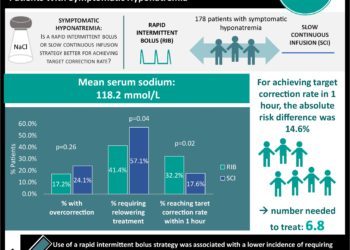Hypotonic IVF linked to increased risk of hyponatremia
Image: PD
1. Hospitalized children receiving hypotonic maintenance intravenous fluids (mIVF) were more likely to develop hyponatremia when compared to patients receiving isotonic mIVF.
2. No differences in incidence of hypernatremia were reported when comparing hypotonic to isotonic mIVF.
Evidence Rating Level: 1 (Excellent)
Study Rundown: Electrolyte imbalances, particularly concerning sodium, are common among patients receiving maintenance intravenous fluids (mIVF) in the hospital setting. Hyponatremia and hypernatremia can both lead to central nervous system symptoms such as lethargy, irritability, and muscle weakness. Severe sodium disturbances can cause seizures, coma, and even death. Therefore, close monitoring of sodium levels is warranted in patients on mIVF. Current practices often include hypotonic mIVF for children, as the hypotonic contents are thought to appropriately mimic human breast milk or cow milk. However, recommendations were initially based on fluid management in healthy children and given that hospitalized children are more prone to electrolyte imbalances, there is concern that hypotonic mIVF may worsen such disturbances. This systematic review included 10 randomized control trials (RCTs) and found a higher risk of hyponatremia associated with the administration of hypotonic mIVF. Risk of hypernatremia did not differ significantly between hypotonic and isotonic mIVF. Though this review, like most meta-analyses, is limited by variability among included studies, it suggests further research into recommended sodium concentration of mIVF in hospitalized children.
Click to read the study published today in Pediatrics
Relevant Reading: The maintenance need for water in parenteral fluid therapy
In-Depth [systematic review]: This study included 10 published RCTs, each comparing use of hypotonic to isotonic mIVF in hospitalized medical and surgical pediatric patients. A random-effects model was used for data analysis, with additional sensitivity analyses performed for missing data. Patients receiving hypotonic mIVF were found to be over twice as likely to develop hyponatremia (plasma Na < 136 mmol/L; relative risk [RR] 2.24, 95% CI: 1.52 – 3.31) than patients receiving isotonic mIVF. Incidence of severe hyponatremia (plasma Na < 130 mmol/L) was also significantly increased among patients receiving hypotonic fluids (RR = 5.29, 95% CI: 1.74 – 16.06). No significant differences in incidence of hypernatremia (plasma Na > 145 mmol/L) were seen between patients receiving hypotonic or isotonic mIVF. A single case of hyponatremic encephalopathy with associated seizures was noted in a child receiving hypotonic mIVF. One included study reported higher risk of new-onset hypertension in 1.54% of patients receiving hypotonic mIVF, with no reports of similar hypertension in patients receiving isotonic mIVF.
By Neha Joshi and Leah H. Carr
More from this author: New risk stratification algorithm suggested for neonatal sepsis, Decreased trainee autonomy suggested with in-hospital intensivist coverage, Decreased incidence of NEC with probiotic supplementation, Increased infections noted with longer duration neonatal PICC placement, Higher BMI in girls correlated with early pubertal development
©2012-2013 2minutemedicine.com. All rights reserved. No works may be reproduced without expressed written consent from 2minutemedicine.com. Disclaimer: We present factual information directly from peer reviewed medical journals. No post should be construed as medical advice and is not intended as such by the authors, editors, staff or by 2minutemedicine.com. PLEASE SEE A HEALTHCARE PROVIDER IN YOUR AREA IF YOU SEEK MEDICAL ADVICE OF ANY SORT.







